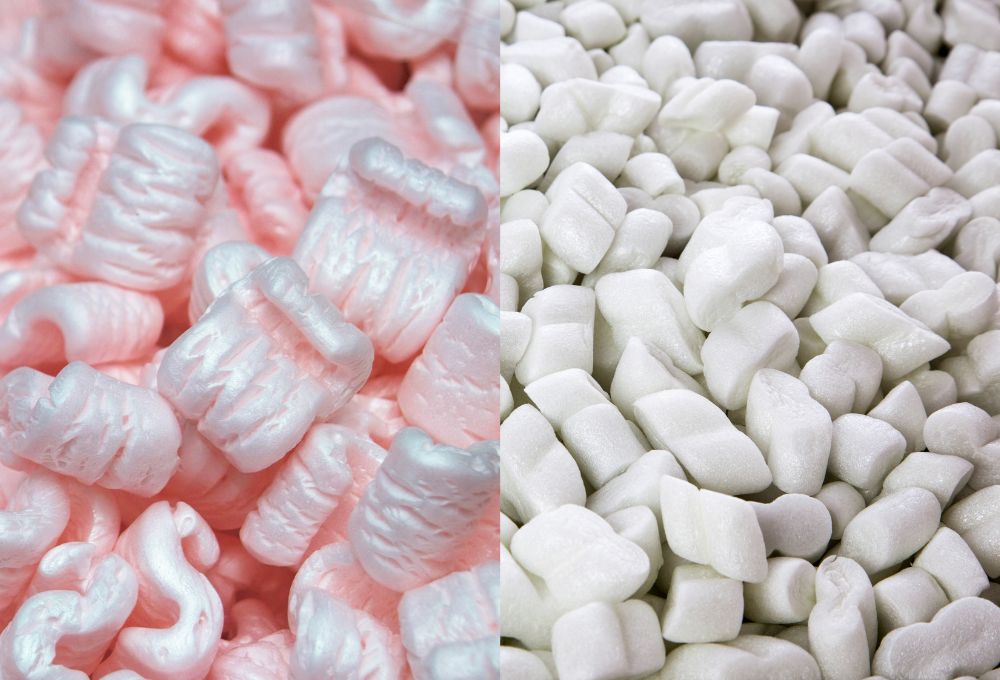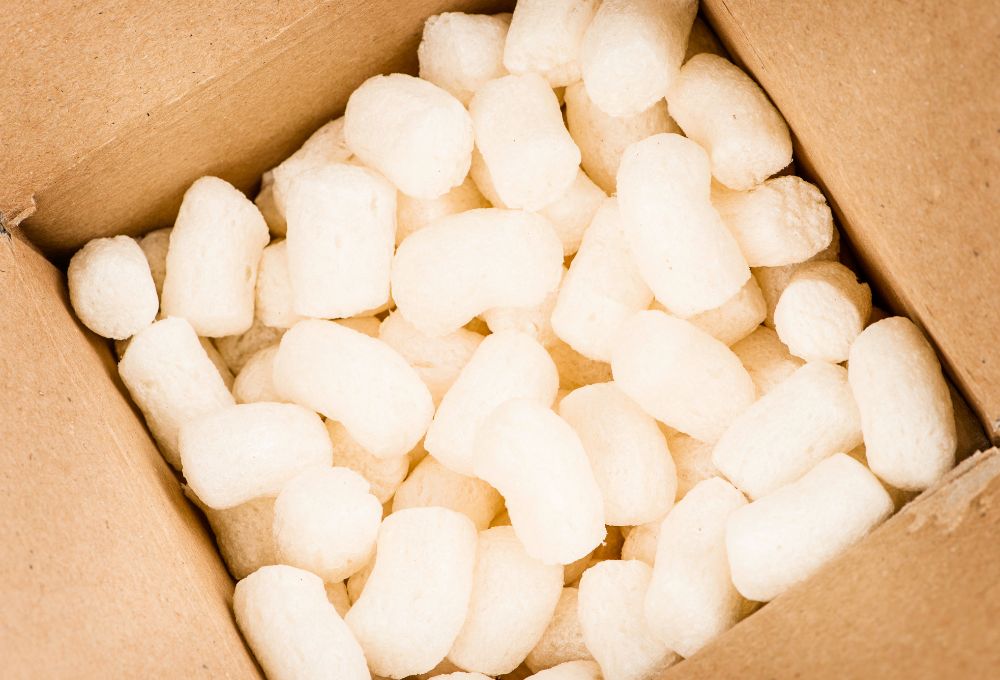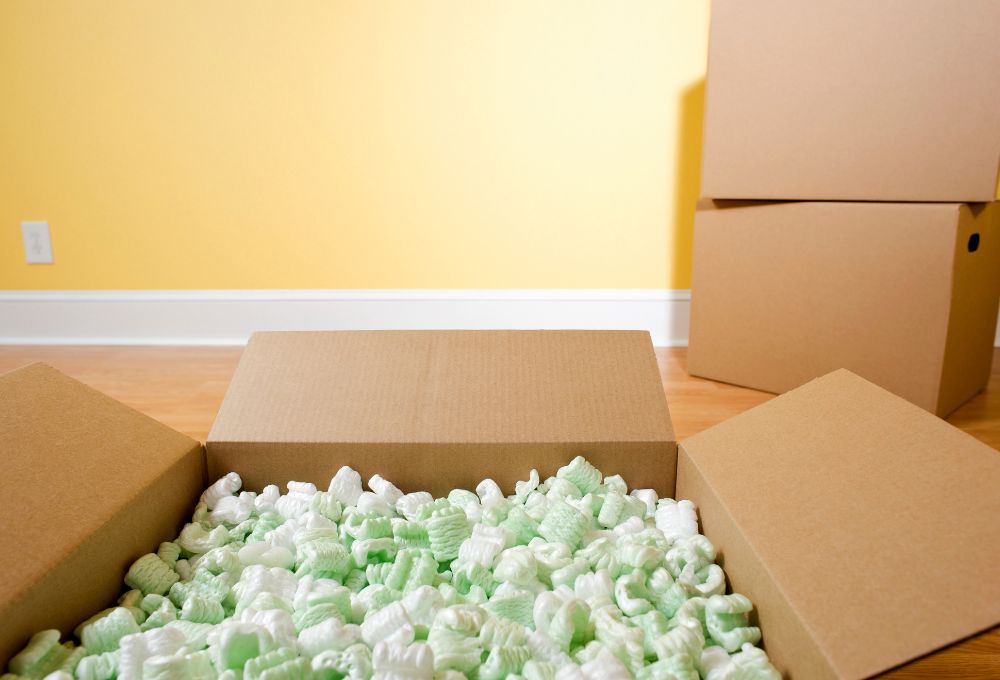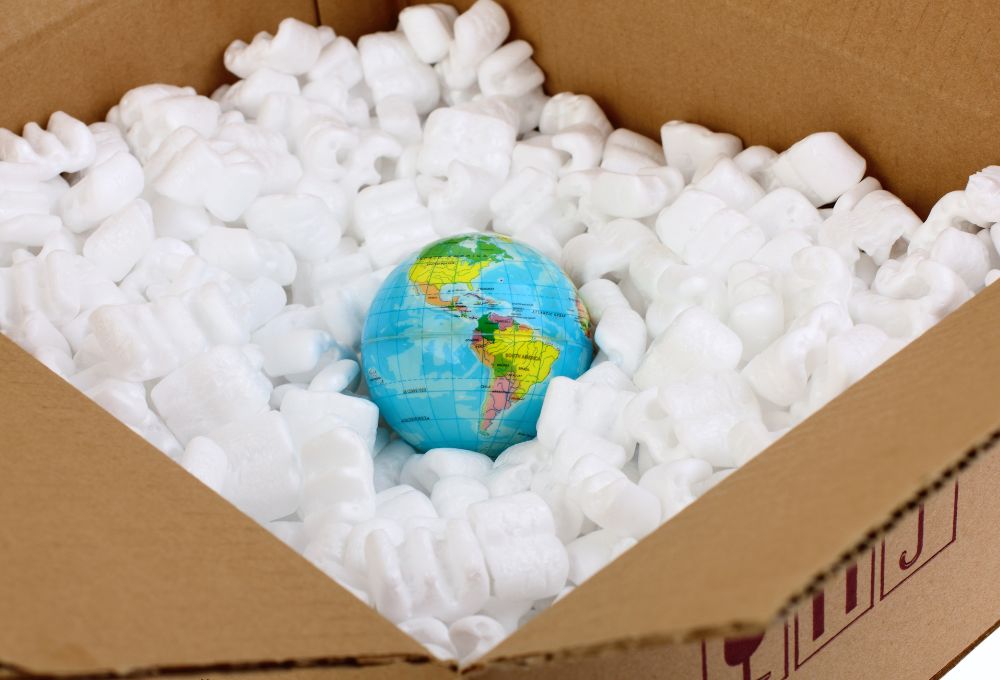Packing peanuts are a frequent solution for transporting fragile products. Many eco-friendly businesses use them in their packaging, and consumers typically feel good knowing that they are environmentally responsible. At least, that was my case.
However, little did I know, that there are different types and different rules apply to each of them.
Spoiler alert! Not all of them are biodegradable or compostable.
I was very confused when I learned this. How am I supposed to know what type of packing peanuts I am receiving? They don’t come with a label or recycling instructions (although this sounds like a great idea).
I would like to share with you what I learned from my research. So, let’s delve into the world of packing peanuts and discover sustainable ways to manage them.
What are Packing Peanuts?
Packing peanuts, also known as foam peanuts or loose fill, are commonly used in packaging to protect delicate and breakable items. They are designed to cushion the contents of a package and prevent damage during shipping or transit.
Types of Packing Peanuts
- Traditional packing peanuts are made from expanded polystyrene (EPS). These are the most commonly used type and are non-biodegradable. They often come in white and pink.
- Biodegradable packing peanuts. These are made from renewable resources or starch-based materials, making them more environmentally friendly.
- Recycled packing peanuts. These are made from recycled EPS and can contain up to 70% recycled material. They often come in green to differentiate from traditional foam-packing peanuts.

EPS packing peanuts

Bio packing peanuts

Recycled packing peanuts
Environmental Impact of Packing Peanuts
Packing peanuts, especially those made from EPS, have a significant impact on the environment. EPS is derived from non-renewable fossil fuels and takes hundreds of years to decompose naturally. When packing peanuts end up in landfills, they occupy space and contribute to the growing waste problem.
Moreover, EPS manufacturing and disposal processes release harmful greenhouse gases, contributing to climate change. The lightweight nature of packing peanuts also poses a threat to wildlife when they are mistakenly ingested.
Can You Recycle Packing Peanuts?
The recyclability of packing peanuts depends on the type you have. Let’s explore the recycling options for traditional packing peanuts and the alternatives for biodegradable packing peanuts.
Recycling Options for Traditional Packing Peanuts
Traditional packing peanuts made from EPS can be recycled into new EPS or picture frames for example. However, the availability of recycling facilities may vary by location. Many shipping and mailing stores accept clean and uncontaminated packing peanuts for reuse. These facilities often collect the packing peanuts and repurpose them for future shipments, reducing waste.
Another option is to check with local recycling centers or facilities that accept EPS. These centers may have specific requirements, such as asking for the packing peanuts to be clean, uncontaminated, and bagged separately.
Biodegradable Packing Peanuts
Biodegradable packing peanuts are designed to break down naturally over time, reducing their environmental impact. However, they won’t break down without additional assistance.
While they are more eco-friendly compared to EPS peanuts, the composting and recycling options for biodegradable packing peanuts are limited.
Recycling Alternatives for Biodegradable Packing Peanuts
One option is composting. Depending on the material composition of the packing peanuts, they may be suitable for composting in a backyard compost pile.
If composting is not feasible, you can contact local recycling facilities or waste management centers to inquire about specific disposal options for biodegradable packing peanuts. Some facilities may accept them for specialized recycling processes, such as transforming them into compost or other useful products.
You could also simply dissolve them in water. Once you have gotten all the use you need, they can be dissolved at home and washed away. Since they are made from natural, plant-based starches, you won’t have to worry about them destroying pipes or polluting the environment.
How do I know if they are biodegradable?
The simple way is to do the water test. Drop a peanut in a glass of warm water and see how it reacts. If it dissolves, you have a biodegradable packing peanut on your hands. If it stays intact after several hours, you’ve got foam.
Benefits of Recycling Packing Peanuts
Recycling packing peanuts offers several benefits. Firstly, it reduces the amount of waste sent to landfills, minimizing environmental impact. By reusing packing peanuts, you also conserve the resources and energy required to produce new packaging materials. Additionally, recycling promotes a circular economy, where materials are reused or repurposed instead of discarded after a single use.
Other Alternatives to Recycle Packing Peanuts
Reusing at Home
If you have traditional packing peanuts made from EPS, check if they are clean and uncontaminated. If so, consider reusing them for your shipments or storing them for future use. By reusing packing peanuts multiple times, you extend their lifespan and reduce waste.
Donating Packing Peanuts
If you have excess packing peanuts and cannot reuse them personally, consider donating them to local shipping stores or individuals who frequently ship delicate items. Donating packing peanuts ensures their continued use and reduces waste within your community.
Creative Uses for Packing Peanuts
Apart from the recycling, packing peanuts can find creative second lives in various DIY projects. Here are a few ideas:
- Use packing peanuts as filler material for stuffed animals or crafts.
- Create a cushioning layer for potted plants to improve drainage.
- Utilize packing peanuts as insulation in the bottom of large planters.
- Incorporate them into art projects or sculptures.
Dispose of Packing Peanuts
If you have no other option but to trash them in the garbage bin, just make sure to collect them in a bag. Don’t throw them directly in the bin. By doing this, you prevent them to end up in oceans or near wildlife.
Conclusion
Packing peanuts, while providing excellent protection for fragile items, can pose environmental challenges when it comes to disposal. By exploring recycling options, reusing packing peanuts, or donating them to local facilities, we can collectively minimize the environmental impact of these packaging materials.
Let’s strive for a zero-waste approach and adopt sustainable practices to protect our planet.
FAQs
Not all packing peanuts are recyclable. Traditional packing peanuts made from expanded polystyrene (EPS) can be recycled in designated locations. But consider that recycling options for packing peanuts are often limited.
Some biodegradable packing peanuts can be composted, depending on their material composition. Check with your local composting facilities to determine if they accept packing peanuts.
If recycling is not available, consider reusing packing peanuts for your shipments or donating them to local shipping stores. You can also explore creative DIY projects that utilize packing peanuts.
Biodegradable packing peanuts are generally considered more environmentally friendly than traditional EPS packing peanuts. However, it is important to follow the proper disposal options.
Yes, packing peanuts can be reused multiple times. If they are clean and uncontaminated, consider using them for future shipments or donate them to individuals or businesses that frequently ship delicate items.

